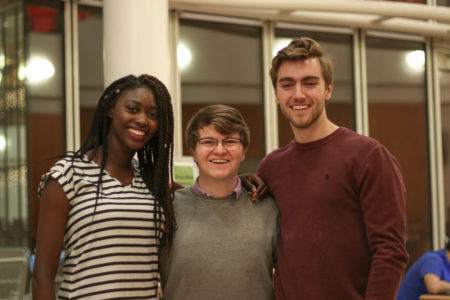
After a competitive election season, the student body elected Myles Becker, Kadiata Toumbou and Riley Murphy, all ’19, to the Student Government Association (SGA) executive cabinet. The election results were announced at 1:30 p.m. on Sunday, Feb. 25, after being held the previous Friday, lasting a 24-hour period from 8 a.m. Feb. 23 to 8 a.m. Saturday, Feb. 24.
The winner of the SGA presidential race was Becker, defeating Dylan Welch ’19 by a margin of 395 to 305 votes. Toumbou won in the vice president of student affairs (VPSA) race with 447 votes, beating challenger Takshil Sachdev ’19, who garnered 235 votes. Murphy was victorious in the vice president of academic affairs (VPAA) contest, besting Joseph Robertson ’19. Murphy won with 405 votes to Robertson’s 223.
These results cap off an election cycle that featured three separate head-to-head contests. Such an environment was naturally competitive between candidates, and its victors rose to the challenges of campaigning.
In an email to The S&B, Toumbou wrote that she felt the election cycle was “really competitive and intimidating.” SGA President-elect Myles Becker acknowledged these difficulties as well, writing, “I think this election cycle was tough for all candidates, especially in the presidential race. … I think the whole election was stressful and exciting and nerve wracking all at once, but I think the most difficult part was knowing how competent and capable my opponent was.”
However, turnout in this election was lower than previous years. For example, 2017’s election results showed 827 total votes for SGA president, in comparison to roughly 700 this year. Murphy chalks this up to the scheduling of the election.
“I think I would have preferred the ballots to be open on a day other than Friday. A lot of people left campus for field trips, athletics, etc. and I think that may have contributed to the lower turnout we saw this year,” Murphy wrote.
Toumbou agreed with these concerns. “I talked to a lot of people who were not aware that SGA elections were happening, which is slightly concerning to me about outreach of events on campus,” she wrote.
An important part of any functional election process is the seamless transition of power. Becker wrote that the elected executives have already planned to meet with those who currently hold their positions, in order to “learn as much about our respective jobs and their requirements as we can,” as well as “to carry forward as much institutional memory as possible.”
As part of this transition of power, all three executives are already planning for cabinet selection, according to emails to The S&B.
“The first step is assembling a Cabinet that brings a variety of experiences to the discussion. … After cabinet selection, the president, VPSA and I will work with them to establish an agenda for next year,” Murphy wrote.
Toumbou put the cabinet selection process in ambitious terms, already looking toward the cabinet’s role in completing goals next year.
“If we as executives are able to choose a supportive, visionary and diverse cabinet, we can get a lot of good things done for the student body,” she wrote.
Regardless of the difficulties of the campaign or challenges to come, this year’s SGA executive elections were an example of the democratic process on the Grinnell campus. For example, Murphy was inspired by his fellow students during the campaign process.
“As I was walking around campus canvassing and getting out the vote, I met a lot of people with amazing ideas, fresh perspectives and positive attitudes, and it really made me feel proud to be a Grinnell student.”
Editor’s note: Riley Murphy ’19 is the business manager for The S&B.



























































